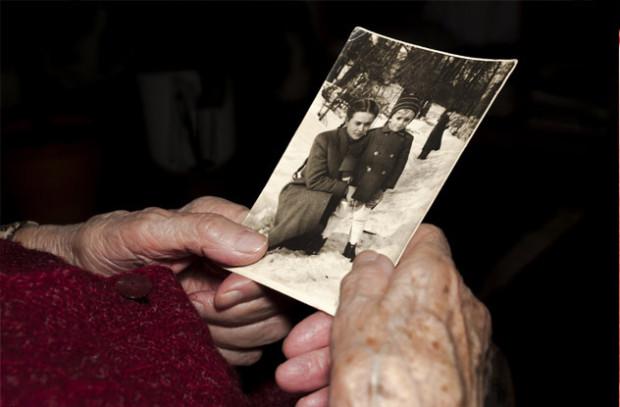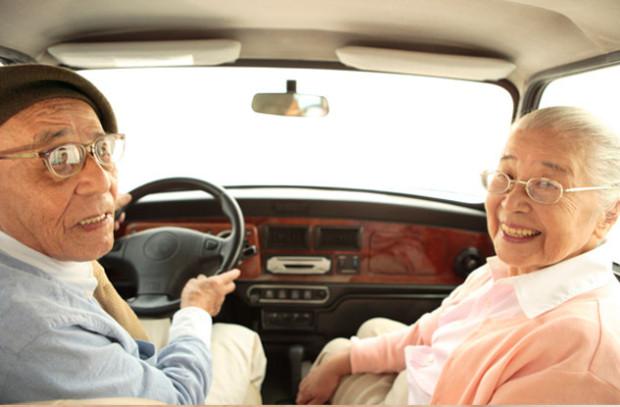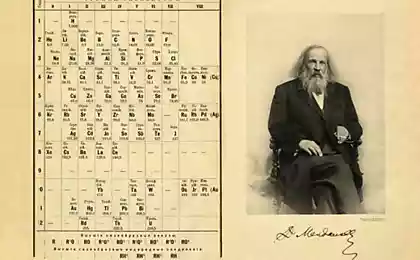713
10 scientifically proven benefits of older
As well as young and even luchshe
You may think that older people are physically weak, often get sick and do not do anything except how to drag society down. Get ready to throw all the preconceptions of the window, because studies show that older have plenty of their own advantages.
1. They cope with stress better than molodye
Contrary to the perception of older people as a capricious old fools, the findings say that they actually have a more optimistic outlook on life than the younger generation. Moreover, they are much better deal with stressful life situations, easily taking the outcome with less anger or anxiety.

Researcher Mary Shollkross explains these results that people gain a rich experience in dealing with the troubles of life over time. Thus, the older a person becomes, the easier he accepts the outcome of the unpleasant events, such as the death of loved ones.
However, this ability comes to naught in a really old age - in the last years of emotional health is deteriorating.
2. Overweight people live dolshe
Old people, like everyone else, should strive to be healthy. But according to a study at Ohio State University, the elderly (especially the fact that over 50) is better to have a few extra kilos on their waist.
Associate Professor of Sociology Hui Zheng found that more fat people in the age of experiencing their slim peers of the same age group. Older people are more susceptible to disease and accompanying weight loss. A few extra kilograms can prevent potentially life-threatening weight loss. In addition, extra weight can serve as an emergency food reserve for old people too sick to eat.
However, Zheng warned that these benefits apply only to people with little overweight, which support its weight at the same level.
3. Nostalgia has therapeutic svoystvami
Your grandparents are constantly telling you stories about the "good old days"? If so, you can forgive you for the natural hatred of nostalgia. Defined as melancholic reflections on the past, nostalgia originally acquired a bad reputation: in XVII-th century it was considered a disease, but in the XX-th - a mental disorder. However, modern researchers have found that nostalgia is really useful, especially for the elderly.

Psychologist at the University of Southampton Constantine Sedikid notes that modern scientists are just beginning to figure out the psychological benefit of nostalgia. On the one hand, it can help combat loneliness, self-esteem of the individual. It can also serve as a bridge between past and present, to keep people in touch with reality and to attach importance to their lives.
4. Older people help humanity evolyutsionirovat
Older people play an important role in the evolution of mankind. According to the anthropologist Rachel Caspari and her colleagues Sang-Hee Lee, human evolution has made a huge leap forward more than 30 000 years ago, namely, for a certain period of time to quadruple the number of elderly people.
Although the exact cause remains unclear, anthropologists suggest that the population explosion occurred when people decided to keep the old, so that they looked after their children and homes, while their parents were at the hunting and gathering. As a result, the survival of the elderly has increased significantly.
More and more elderly people settled together and can share experiences with each other, which led to widespread information, which influenced future generations. As Lee said, the elderly have become something of a computer hard drive for the young humanity.
5. They are still a lot of sex
The idea that people aged are free from sex life, could not be further from the truth. According to US research-2013, older people enjoy sex much more than any of us could imagine. For example, more than 50% of the respondents belonging to the age group of 57 to 75 years reported that the practice of oral sex, while one-third of survey respondents in the group of 75-to 85-minute make full sexual intercourse.

The study found a significant problem as much as it breaks stereotypes: the elderly suffer sexually transmitted infection. According to the Center for Disease Control and Prevention, the number of elderly people, priobrёtshih sexually transmitted infection, with 2007 year increased, mainly due to lack of awareness of safety measures. Public health experts Ezekiel Emanuel encourages health care workers to provide care for older people in sexual education, because sex naturally occurs in people living in the immediate vicinity (in nursing homes, for example).
6. Their driving skills are significantly uluchshilis
Good news for all on the road: the results of research conducted by the Institute for Highway Safety USA (IIHS), it was found that the number of accidents and accidents involving older drivers in the last decade has declined considerably. And those who fall into the accident is now much more likely to survive and have fewer injuries.
Since 1997, the number of fatalities in accidents fell by 42%, as well as the number of non-fatal cases. For the Institute it was surprising because the researchers had expected that the increase in the elderly population will create more accidents on the road.
This positive trend can be linked with modern cars, which tend to be safer than previous models. Another important factor is to improve the physical and mental health of the elderly, which can constrain the number of accidents.
7. They can be the key to peace in the entire mire
The Roman Empire was a long period of peace time, known as the «Pax Romana», and some say that soon we are waiting for his modern version of its modern older generation.

Mark Haas of the International Security Program at Harvard University notes that the rapid aging of the population will force the US government to spend more budget on pensions and health care system for the elderly, rather than tanks and planes. In the foreseeable future, the US is still seen as the dominant economic and military power, because competing countries such as Russia and China are even more prone to the trend of rapid population aging.
Supporters of the current US foreign policy say that a forced «Pax Geriatrica» («the world of the elderly") will have its drawbacks. The United States will be less able to allow the police to intervene in localized conflicts. Reducing military and security spending could also make the United States more vulnerable to terrorist attacks.
8. Our genes tell us to respect starshih
We respect the elders is not simply because of the good manners and maturity - we can be programmed for it.
In 2010, the University of Rennes in France, carefully studied the habits of communication in a group of monkeys Campbell. The team of scientists said that older monkeys, who shouted, meet more frequently, though they talked much less than younger. This suggests that older monkeys - because of their long experience of survival and high rank in the social hierarchy - are much more influential in a group that commits the young monkeys to give them attention.
Some may interpret the results as a sociological phenomenon, not a biological one, and some may think that they apply only to the subjects. But the researchers conclude that respect for elders is an evolutionary feature that can be found, as a rule, all primates, including humans.
9. Their brain is slower (but only because of the wisdom) 33,468,068
While we are young obaldui, joking about how painfully slow old people think and say, they do so only because their brain stores a lot of information. Combined with the fact that they need less brain dopamine than before, the elderly are also more thoughtful and far less likely to act on impulse than the younger generation. However, the elderly can still handle the new information, albeit at a slower pace, and for the same reason, said slowly.
Scientists believe that the unique characteristics of the aging brain biologically equal wisdom. As summarized Denise Park of the University of Dallas Center for longevity: "There is a reason that the 20-year-olds do not rule the world».
10. Older workers are more superior molodyh
To find out how often to change the level of cognitive activity of the employees, the Institute for Human Development in Berlin, the Max Planck divided the participants in the experiment into two groups according to their age (20-31 and 65-80). All participants are repeatedly performed a series of cognitive tasks for 100 days.
The level of cognitive activity in the older group changed significantly less than younger, in other words, they were doing their work more consistently. Researchers explain the consistent performance of older workers of their emotional stability, as well as the experience of the presence of some tasks.
via factroom.ru

You may think that older people are physically weak, often get sick and do not do anything except how to drag society down. Get ready to throw all the preconceptions of the window, because studies show that older have plenty of their own advantages.
1. They cope with stress better than molodye

Contrary to the perception of older people as a capricious old fools, the findings say that they actually have a more optimistic outlook on life than the younger generation. Moreover, they are much better deal with stressful life situations, easily taking the outcome with less anger or anxiety.

Researcher Mary Shollkross explains these results that people gain a rich experience in dealing with the troubles of life over time. Thus, the older a person becomes, the easier he accepts the outcome of the unpleasant events, such as the death of loved ones.
However, this ability comes to naught in a really old age - in the last years of emotional health is deteriorating.
2. Overweight people live dolshe

Old people, like everyone else, should strive to be healthy. But according to a study at Ohio State University, the elderly (especially the fact that over 50) is better to have a few extra kilos on their waist.
Associate Professor of Sociology Hui Zheng found that more fat people in the age of experiencing their slim peers of the same age group. Older people are more susceptible to disease and accompanying weight loss. A few extra kilograms can prevent potentially life-threatening weight loss. In addition, extra weight can serve as an emergency food reserve for old people too sick to eat.
However, Zheng warned that these benefits apply only to people with little overweight, which support its weight at the same level.
3. Nostalgia has therapeutic svoystvami

Your grandparents are constantly telling you stories about the "good old days"? If so, you can forgive you for the natural hatred of nostalgia. Defined as melancholic reflections on the past, nostalgia originally acquired a bad reputation: in XVII-th century it was considered a disease, but in the XX-th - a mental disorder. However, modern researchers have found that nostalgia is really useful, especially for the elderly.

Psychologist at the University of Southampton Constantine Sedikid notes that modern scientists are just beginning to figure out the psychological benefit of nostalgia. On the one hand, it can help combat loneliness, self-esteem of the individual. It can also serve as a bridge between past and present, to keep people in touch with reality and to attach importance to their lives.
4. Older people help humanity evolyutsionirovat

Older people play an important role in the evolution of mankind. According to the anthropologist Rachel Caspari and her colleagues Sang-Hee Lee, human evolution has made a huge leap forward more than 30 000 years ago, namely, for a certain period of time to quadruple the number of elderly people.
Although the exact cause remains unclear, anthropologists suggest that the population explosion occurred when people decided to keep the old, so that they looked after their children and homes, while their parents were at the hunting and gathering. As a result, the survival of the elderly has increased significantly.
More and more elderly people settled together and can share experiences with each other, which led to widespread information, which influenced future generations. As Lee said, the elderly have become something of a computer hard drive for the young humanity.
5. They are still a lot of sex
The idea that people aged are free from sex life, could not be further from the truth. According to US research-2013, older people enjoy sex much more than any of us could imagine. For example, more than 50% of the respondents belonging to the age group of 57 to 75 years reported that the practice of oral sex, while one-third of survey respondents in the group of 75-to 85-minute make full sexual intercourse.

The study found a significant problem as much as it breaks stereotypes: the elderly suffer sexually transmitted infection. According to the Center for Disease Control and Prevention, the number of elderly people, priobrёtshih sexually transmitted infection, with 2007 year increased, mainly due to lack of awareness of safety measures. Public health experts Ezekiel Emanuel encourages health care workers to provide care for older people in sexual education, because sex naturally occurs in people living in the immediate vicinity (in nursing homes, for example).
6. Their driving skills are significantly uluchshilis

Good news for all on the road: the results of research conducted by the Institute for Highway Safety USA (IIHS), it was found that the number of accidents and accidents involving older drivers in the last decade has declined considerably. And those who fall into the accident is now much more likely to survive and have fewer injuries.
Since 1997, the number of fatalities in accidents fell by 42%, as well as the number of non-fatal cases. For the Institute it was surprising because the researchers had expected that the increase in the elderly population will create more accidents on the road.
This positive trend can be linked with modern cars, which tend to be safer than previous models. Another important factor is to improve the physical and mental health of the elderly, which can constrain the number of accidents.
7. They can be the key to peace in the entire mire

The Roman Empire was a long period of peace time, known as the «Pax Romana», and some say that soon we are waiting for his modern version of its modern older generation.

Mark Haas of the International Security Program at Harvard University notes that the rapid aging of the population will force the US government to spend more budget on pensions and health care system for the elderly, rather than tanks and planes. In the foreseeable future, the US is still seen as the dominant economic and military power, because competing countries such as Russia and China are even more prone to the trend of rapid population aging.
Supporters of the current US foreign policy say that a forced «Pax Geriatrica» («the world of the elderly") will have its drawbacks. The United States will be less able to allow the police to intervene in localized conflicts. Reducing military and security spending could also make the United States more vulnerable to terrorist attacks.
8. Our genes tell us to respect starshih

We respect the elders is not simply because of the good manners and maturity - we can be programmed for it.
In 2010, the University of Rennes in France, carefully studied the habits of communication in a group of monkeys Campbell. The team of scientists said that older monkeys, who shouted, meet more frequently, though they talked much less than younger. This suggests that older monkeys - because of their long experience of survival and high rank in the social hierarchy - are much more influential in a group that commits the young monkeys to give them attention.
Some may interpret the results as a sociological phenomenon, not a biological one, and some may think that they apply only to the subjects. But the researchers conclude that respect for elders is an evolutionary feature that can be found, as a rule, all primates, including humans.
9. Their brain is slower (but only because of the wisdom) 33,468,068
While we are young obaldui, joking about how painfully slow old people think and say, they do so only because their brain stores a lot of information. Combined with the fact that they need less brain dopamine than before, the elderly are also more thoughtful and far less likely to act on impulse than the younger generation. However, the elderly can still handle the new information, albeit at a slower pace, and for the same reason, said slowly.
Scientists believe that the unique characteristics of the aging brain biologically equal wisdom. As summarized Denise Park of the University of Dallas Center for longevity: "There is a reason that the 20-year-olds do not rule the world».
10. Older workers are more superior molodyh

To find out how often to change the level of cognitive activity of the employees, the Institute for Human Development in Berlin, the Max Planck divided the participants in the experiment into two groups according to their age (20-31 and 65-80). All participants are repeatedly performed a series of cognitive tasks for 100 days.
The level of cognitive activity in the older group changed significantly less than younger, in other words, they were doing their work more consistently. Researchers explain the consistent performance of older workers of their emotional stability, as well as the experience of the presence of some tasks.
via factroom.ru
"Operation Cinderella" - fashion how to change the shape of the toes
In the United States opened a coffee shop, where there is no staff























